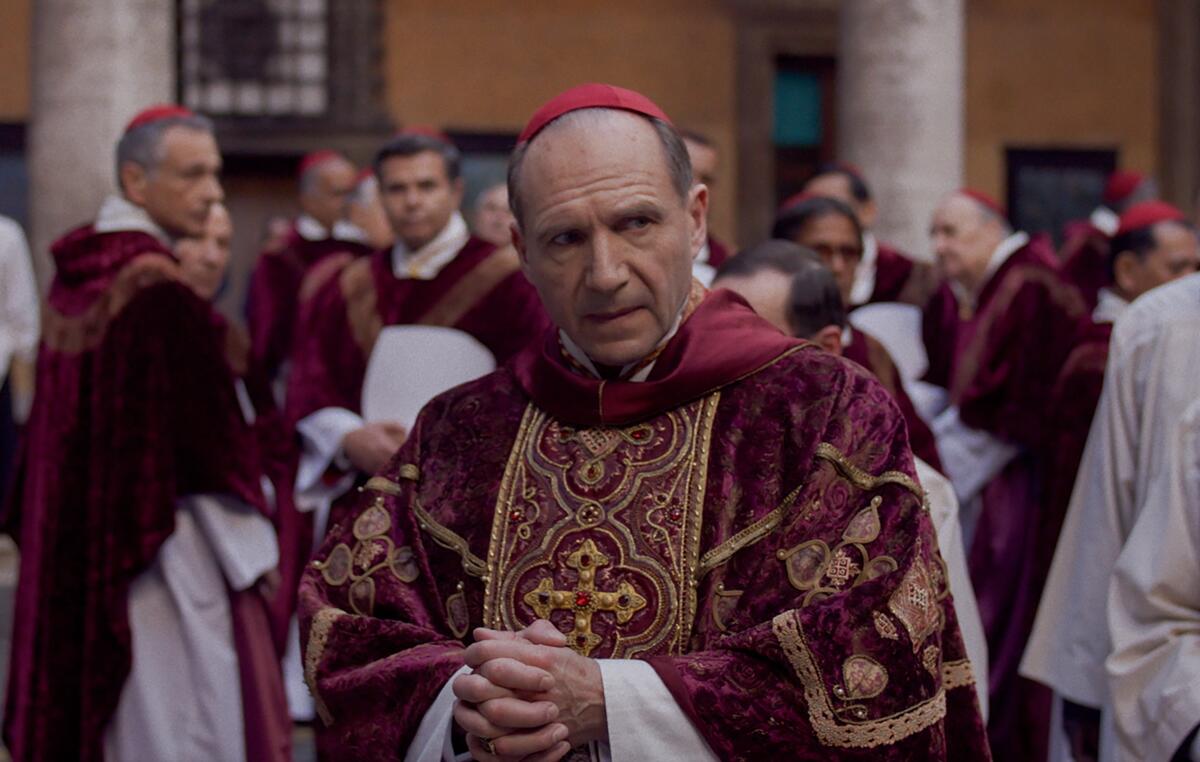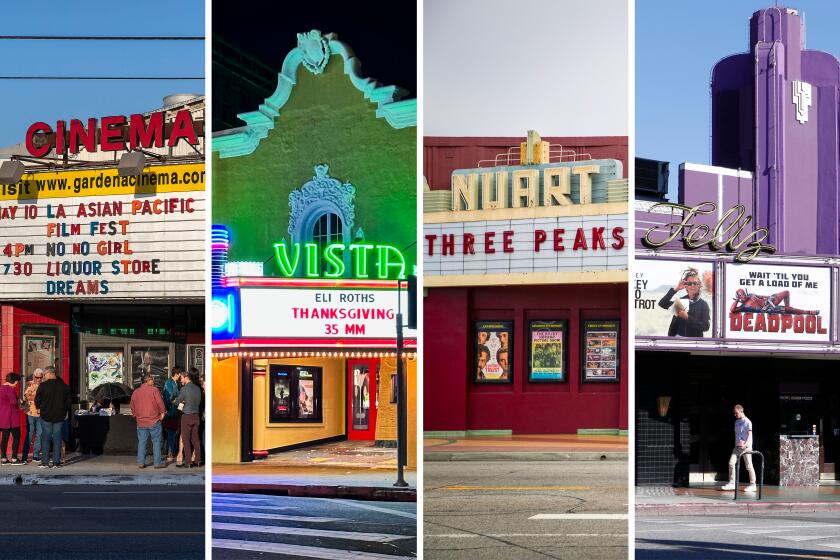Review: In ‘Conclave,’ a quest to elect a new pope leads down some less-than-holy pathways

- Share via
Soon, voters will have a choice: Do you go for the candidate you believe in? Or do you opt to keep a right-wing strongman out of power? Ideally, those goals and desires will overlap, and while a version of this question may already be on your mind, the specific electorate I’m referring to happens to be a group of cardinals, sequestered in the Vatican in Edward Berger’s “Conclave.”
Adapted by Peter Straughan from the Robert Harris 2016 novel, the handsomely rendered and meticulously acted “Conclave” encompasses these universal struggles within the rigorously regimented ritual of electing a new pope. Rife with backroom skulduggery among the conniving cardinals, as well as a Pakula-esque penchant for stairwell whisper campaigns among the power brokers, “Conclave” is less of a searching philosophy piece than it is a scandalously twisty papal potboiler.
Cardinal Lawrence (Ralph Fiennes) is charged with stewarding the conclave after the death of the pope — a job he is reluctant to tackle. The white smoke can only go up when one of the cardinals receives a 72-vote majority, and shepherding this bunch of squabbling, power-hungry backstabbers to that number is going to require a herculean feat of delicate diplomacy, maybe even an act of God or two.
This would probably be an easier task for a less-principled cardinal. Alas, the burden to elect the right pope weighs heavy on Lawrence, and the responsibility is complicated by the fact that unsavory rumors and controversy swirl around three of the most ambitious front-runners: the meddling Cardinal Tremblay (John Lithgow), the too-suave Cardinal Adeyemi (Lucian Msamati), and the ultratraditional, constantly vaping Cardinal Tedesco (Sergio Castellitto). Lawrence, however, would like to throw his support toward the quietly progressive Cardinal Bellini (Stanley Tucci), who shirks from the possibility.
The character actor emerged from the pandemic more popular than ever: a negroni-mixing food mentor. With “Conclave,” Tucci is here to remind us of his chops.
The conclave is also disrupted by an unexpected guest: a cardinal secretly appointed by the pope. The archbishop of Kabul, a mysterious Cardinal Benitez (Carlos Diehz), arrives unannounced, his presence sending a ripple through the dynamic, a quiet bomb waiting to go off as he becomes a surprising dark horse candidate for the gig.
Lawrence himself refuses the role outwardly, citing a crisis of faith, but there are those who accuse him of harboring such ambitions. Fiennes, who is so restrained in his performance it is almost pained, manages to let the shadow of hope cross his carefully composed face. Maybe, if the votes go his way, it might actually happen. This subtle subplot, performed so beautifully by Fiennes, is the true jewel at the center of the film.
The cloistered politicking devolves into lunchroom antics and social warfare akin to a high school movie, but this swirling whirlpool of interpersonal drama is grounded by the pomp and circumstance of centuries-old ritual: garments and ballots and hierarchy. However, director Berger (“All Quiet on the Western Front”) takes a modern approach to the film’s style. Production designer Suzy Davies delivers a set of dramatic reds, whites and blacks — harsh, shiny surfaces with a certain coldness. Cinematographer Stéphane Fontaine utilizes the unique scale and scope of the Vatican to deliver breathtaking compositions and slowly-creeping zooms that add to the pressure of the claustrophobic atmosphere. The slashing strings of composer Volker Bertelmann’s score ably convey the stakes of the situation.
We’ve mapped out 27 of the best movie theaters in L.A., from the TCL Chinese and the New Beverly to the Alamo Drafthouse and which AMC reigns in Burbank.
But the richness of the filmmaking, including the powerful acting, obfuscates the fact that the story itself is a pretty thin and silly mystery with twists that cheapen the intellectual quandary at the center of the tale. The script wants to wrestle with the question about whether the church can make progress and adapt to the modern world, but all the subtext is text. “Conclave” doesn’t invite the audience to dig deeper; it provides all the questions and answers bluntly, then distracts us with a variety of surprising turns that, strangely, are all presented with the same amount of scandal, though they do not exist on the same moral scale.
“Conclave” is a film that seems like it’s deeper than it actually is. In reality, it’s a bit of a down-the-middle thriller that flirts with tawdriness as it presents the inner workings of the highly secretive Vatican. While the screenplay’s themes can be extrapolated to broader sociopolitical questions, it fails to impart any new insights beyond the basic notion that cardinals, they’re just like us.
Katie Walsh is a Tribune News Service film critic.
'Conclave'
Rated: PG, for thematic material and smoking
Running time: 2 hours
Playing: In wide release Friday, Oct. 25
More to Read
Only good movies
Get the Indie Focus newsletter, Mark Olsen's weekly guide to the world of cinema.
You may occasionally receive promotional content from the Los Angeles Times.












